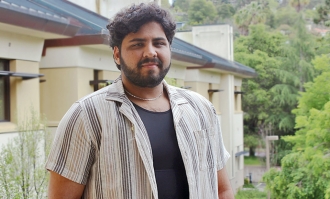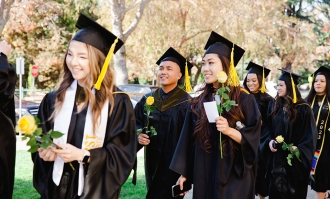- News
- News Archive
- Research Students Utilizing Supercomputers For Simulations
Research Students Utilizing Supercomputers For Simulations

Current and former students in Dr. Randall Hall’s Research Methodology class at Dominican University of California are accessing supercomputers at UC San Diego to conduct sophisticated molecular dynamics simulations examining how compounds formed as compost decomposes in soils retain water and promote photosynthesis.
The access is granted via the National Science Foundation’s Extreme Science and Engineering Discovery Environment (XSEDE). Ongoing research by Dr. Hall and Dr. Kenneth Frost, adjunct professor in the Department of Natural Sciences and Mathematics, focuses on investigating chemical and physical properties of compost degradation products.
“It is known that compost helps soil retain water and thereby promotes plant growth and carbon sequestration via photosynthesis,” says Dr. Hall, the Lillian L.Y. Wang Yin, Ph.D. Endowed Professor of Chemistry in the School of Health and Natural Sciences. “We want to understand the way in which compost degradation products help to retain water on the microscopic level and also to the propensity of different compost degradation products to leach into the groundwater.”
Dr. Hall is recruiting his students to assist with the research. Some are collaborating with him this summer.
DOMINICAN UNDERGRADUATE MAJORS AND PROGRAMS
“Our students perform laboratory measurements of the partitioning of model degradation compounds between a clay (our model for soil) and water,” Dr. Hall says. “The students also use the Comet supercomputer at the NSF XSEDE supercomputer center at UC San Diego to calculate the expected partitioning of the different model compounds between clay and water. By comparing experiment and calculation we hope to develop a detailed and predictive understanding of both water retention and product leaching.”
The compost projects have been a work in progress for several years. Numerous Dominican graduates have contributed to research including Trevor Yeh ‘19, now in the PhD program in biophysics at the University of Michigan, Jorden Tahquechi ’19 MS ’21, who is currently in the MS Biology program at BioMarin, and Kaylee Castro, who has started the Masters of Nursing program at the University of San Francisco. These students helped pave the way for current students such as Elizabeth Lockerby ’22 who, with Kaylee Castro this past spring semester, came to campus one day a week to perform lab experiments under Dr. Frost and Dr. Hall’s supervision. This summer, Elizabeth Lockerby and Richele “Chili” Phaler ’24 are continuing the experiments and calculations. They also run simulations from their homes, using free open source software that connect them to the Comet computer. (Image in Zoom call screenshot above includes their images and example of supercomputer code/data they are analyzing).
“The challenging part is having them analyze the data, which in previous years would require them to come to campus to use commercial software and software I have written to complete the analysis,” Dr. Hall says. “Since this was not possible, I rewrote the analysis software in the computer language python – a very common introductory language – and the students were then able to use the python software along with a free python `environment’ called a Jupyter Notebook to perform the analysis and upload the results to a shared google sheet. We used Zoom quite a bit for short lectures and meetings to discuss next steps in the calculations.”
Dr. Hall, who did manage to conduct in-person lectures with some students during the spring semester, adjusted well to online sessions.
“My research courses were small enough that we were able to meet once a week in person with Zoom meetings during the week,” he says. “Moving back to in person this fall will be very helpful from both a pedagogical perspective – seeing faces or at least eyebrows let the instructor get a much better sense of how the students are understanding the material – and a logistical perspective as it easier to answer questions by looking over a student’s shoulder than by exchanging email or screen sharing.”



